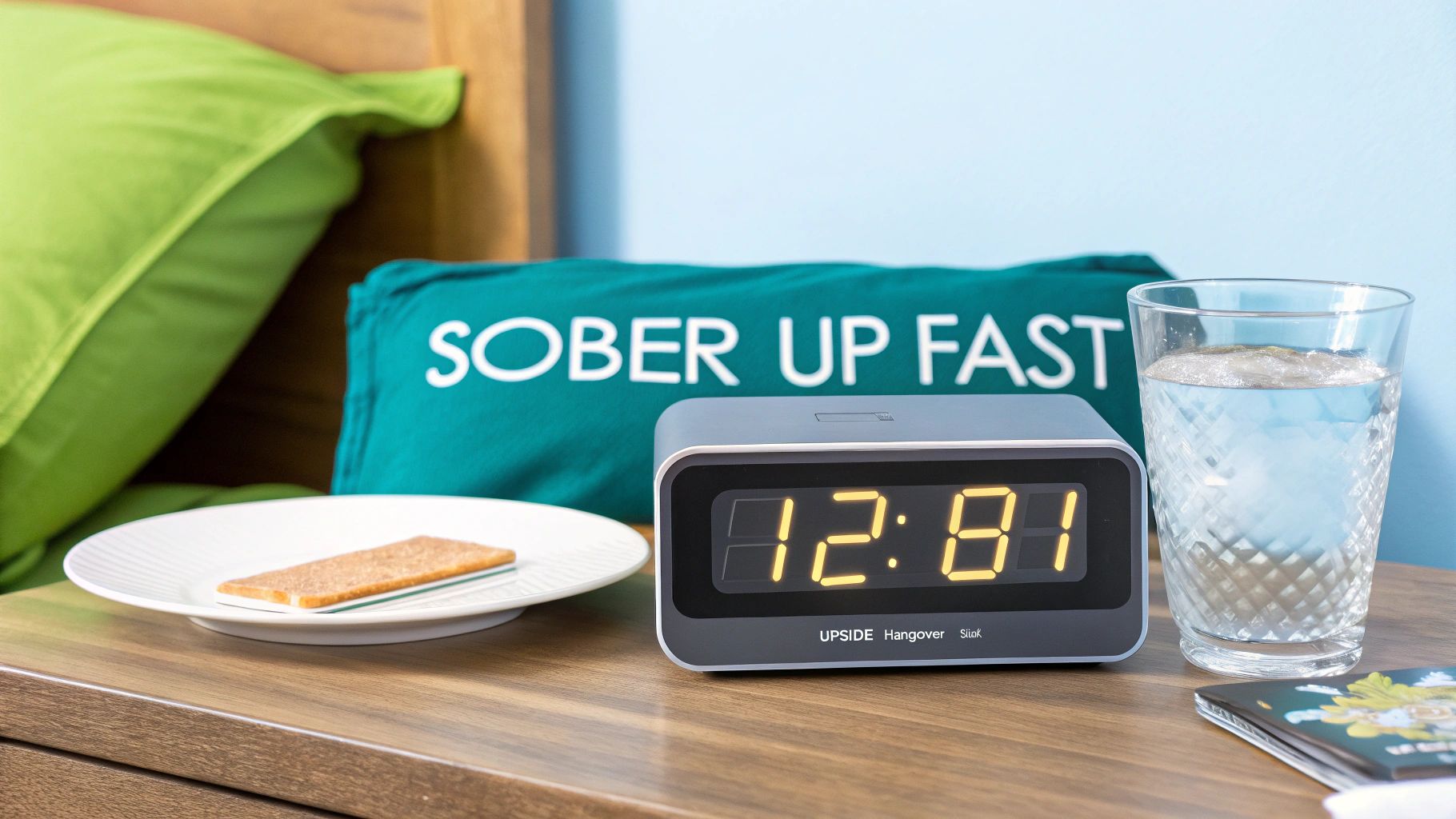

· By Annemarie
How to Sober Up Quickly What Actually Works
Let’s get one thing straight: if you’re looking for a quick fix to sober up, you’re not going to find one. I know, it's the hard truth nobody wants to hear when they've had one too many. The only thing that truly sobers you up is time. While some classic tricks might make you feel more alert, they won't do a single thing to speed up how fast your liver gets alcohol out of your system.
The Reality of Sobering Up Quickly
When you're feeling more intoxicated than you planned, it's natural to start frantically searching for a way to reverse it. We've all been there. People swear by all sorts of methods, hoping for that magic bullet to sober them up on the spot. But honestly, most of these popular "remedies" just give you a false sense of security without actually lowering your Blood Alcohol Content (BAC).
Debunking Common Sobering Myths
We need to talk about some of the most stubborn myths out there. A freezing cold shower? Sure, it'll jolt you awake. A strong cup of coffee? It’ll definitely make you feel less groggy. But here’s the problem: feeling more awake is not the same as being sober.
These so-called "fixes" have zero impact on your liver's metabolic process. In fact, loading up on caffeine can actually be a bad move. It can easily trick you into thinking you're okay to do things like drive, when your coordination and judgment are still seriously impaired. Your BAC is still sky-high, no matter how wide-eyed you feel.
Key Takeaway: Methods like drinking coffee, taking a cold shower, or even trying to "sweat it out" do not lower your BAC. They only mask the symptoms of being drunk, which can lead you to make some pretty risky decisions.
Your Liver Sets the Pace
Your body has a very specific system for getting rid of alcohol, and it’s called zero-order elimination. That’s a fancy way of saying it works at a fixed, constant rate. Your liver does almost all the heavy lifting, and it can only process about one standard drink per hour. Nothing you do can make it work any faster.
This infographic breaks down exactly how your body handles alcohol, from the first sip to the long process of elimination.
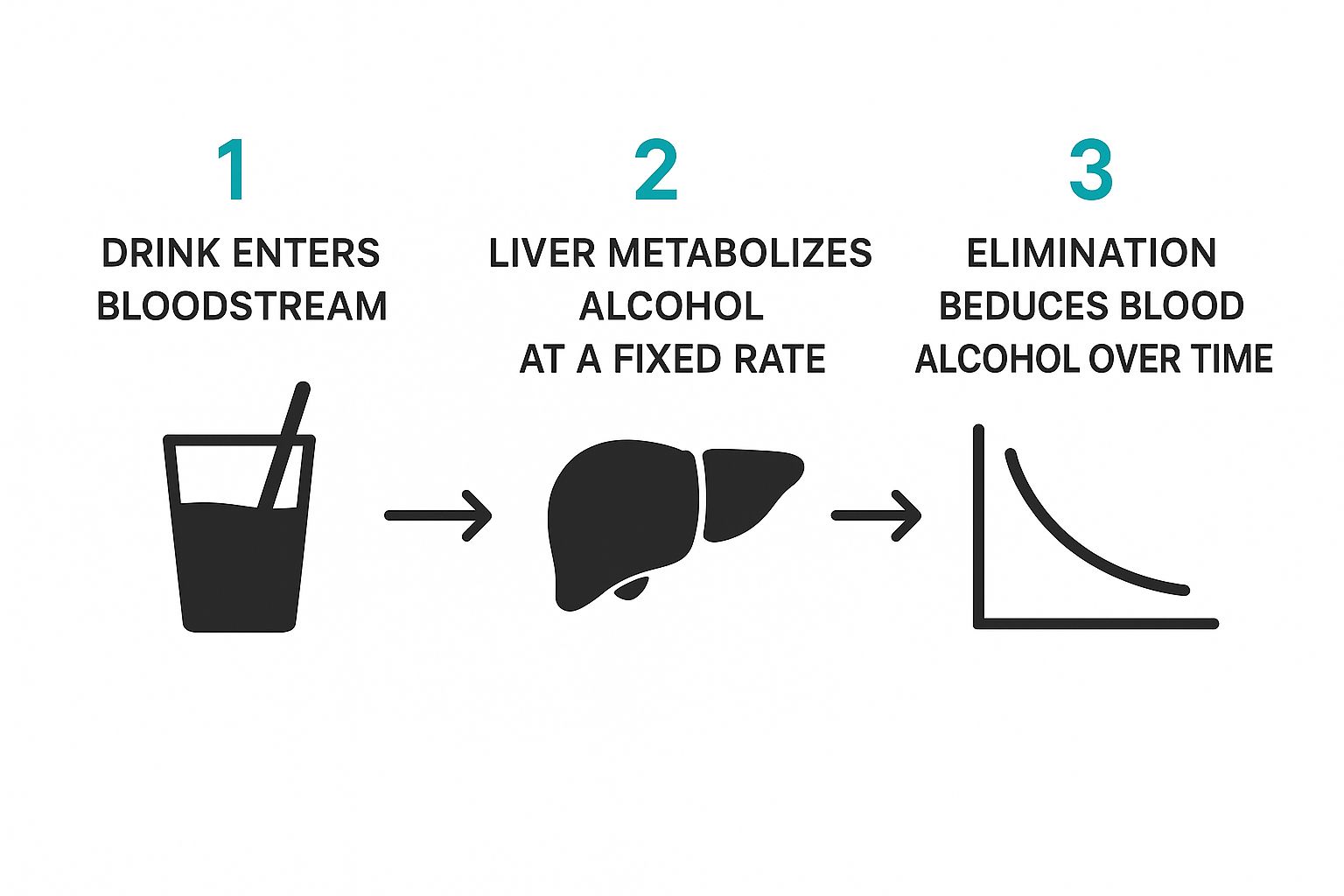
As you can see, once alcohol is in your system, your liver just chugs along at its own steady, unchangeable pace. Because of this fixed rate, your BAC typically drops by about 0.015 every hour. If you're interested in the nitty-gritty, you can dig deeper into the science of alcohol metabolism to understand why.
We've heard all the tricks in the book, so let's put some of the most common ones to rest.
Common Sobering Up Myths vs Reality
| Common Myth | Why It Doesn't Work | What You Should Do Instead |
|---|---|---|
| Drinking strong coffee | Caffeine is a stimulant that masks drowsiness but doesn't lower your BAC. It creates a "wide-awake drunk" state, which is dangerous. | Drink water or an electrolyte drink to rehydrate. Caffeine will only dehydrate you more. |
| Taking a cold shower | The shock might make you feel more alert for a moment, but it does nothing to speed up alcohol metabolism in your liver. | Rest and allow your body time to process the alcohol. A shower won't hurt, but don't count on it to sober you up. |
| Eating a greasy meal | Food can slow the absorption of alcohol if you eat it before or while drinking, but it can't sober you up once the alcohol is already in your blood. | Eat a light, balanced meal to stabilize your blood sugar and get some nutrients in your system. |
| "Sweating it out" | A tiny amount of alcohol leaves through sweat, but it's less than 1%. Trying to sweat through exercise can lead to severe dehydration and is risky. | Focus on rehydrating and resting. Let your liver do the real work. |
Ultimately, this biological reality is why patience is your only true friend here. While you can't rush sobriety, you can take steps to support your body and feel a bit more comfortable while you wait for time to do its thing. The next sections will walk you through some practical ways to manage the not-so-fun symptoms safely and effectively.
Understanding Your Body's Sobering Process
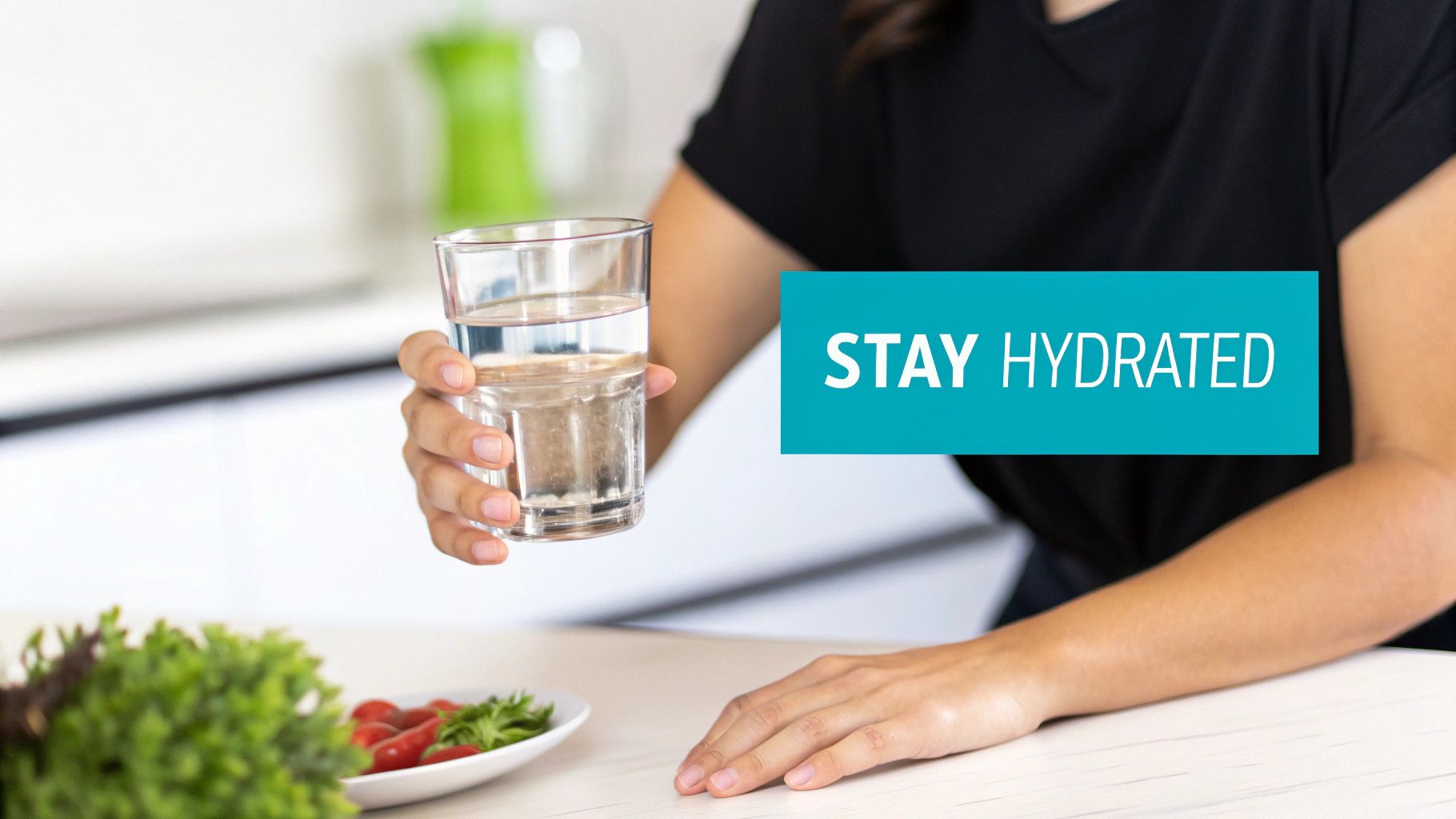
If you want to get a handle on sobering up, you first have to understand what’s actually going on inside your body. The whole process comes down to biology, with your liver playing the starring role. Think of it as your body's personal filtration plant, working overtime to break down every drop of alcohol.
Here’s the thing, though: your liver isn't a magic wand. It works at its own set pace, metabolizing about one standard drink per hour. That rate is pretty much set in stone. No amount of wishful thinking, cold showers, or chugging coffee can make it go any faster. Once alcohol hits your bloodstream, your liver just has to methodically work its way through it.
This is exactly why Blood Alcohol Content (BAC) is such a big deal. It’s a measure of the alcohol concentration in your blood, and it’s affected by a lot more than just how many drinks you’ve had.
Factors That Influence Your Sobering Timeline
Ever noticed how one friend seems totally fine after three drinks while another is already feeling it? That’s because a bunch of personal factors directly impact how your body handles alcohol.
These variables explain why everyone’s experience with drinking is so different:
- Body Weight and Composition: Someone with a higher body weight or more muscle generally has more water in their body to dilute alcohol, which can lead to a lower BAC.
- Biological Sex: On average, women have less of the key alcohol-metabolizing enzyme (alcohol dehydrogenase) and a lower body water percentage than men. This often means a higher BAC from the same amount of booze.
- Food Intake: Eating before or while you drink—especially protein and fats—is a game-changer. It slows down how quickly alcohol gets absorbed into your bloodstream, giving your liver a fighting chance to keep up.
- Type and Number of Drinks: It’s simple math. The stronger your drinks and the faster you down them, the higher your BAC will spike and the longer it’ll take for you to feel normal again.
Let’s put this in a real-world context. A 180-pound man and a 130-pound woman could both have three glasses of wine with dinner, but their experiences will be worlds apart. He might just feel a light buzz. She, on the other hand, could feel significantly intoxicated, and her body will probably take a lot longer to clear the alcohol.
Knowing these differences is what separates smart drinking from a night you'll regret. When you understand that your body's sober-up speed is unique, you can plan better and stay safer. It's not just about counting drinks; it's about knowing your own system.
The science of it all is actually pretty fascinating. If you’re curious and want to get into the nitty-gritty, our guide on how alcohol is metabolized breaks down the entire journey, from your first sip to final elimination.
Ultimately, accepting your body’s natural rhythm is the first step. You can’t cheat the system, but you can definitely work with it.
Actionable Steps to Feel Better While You Wait
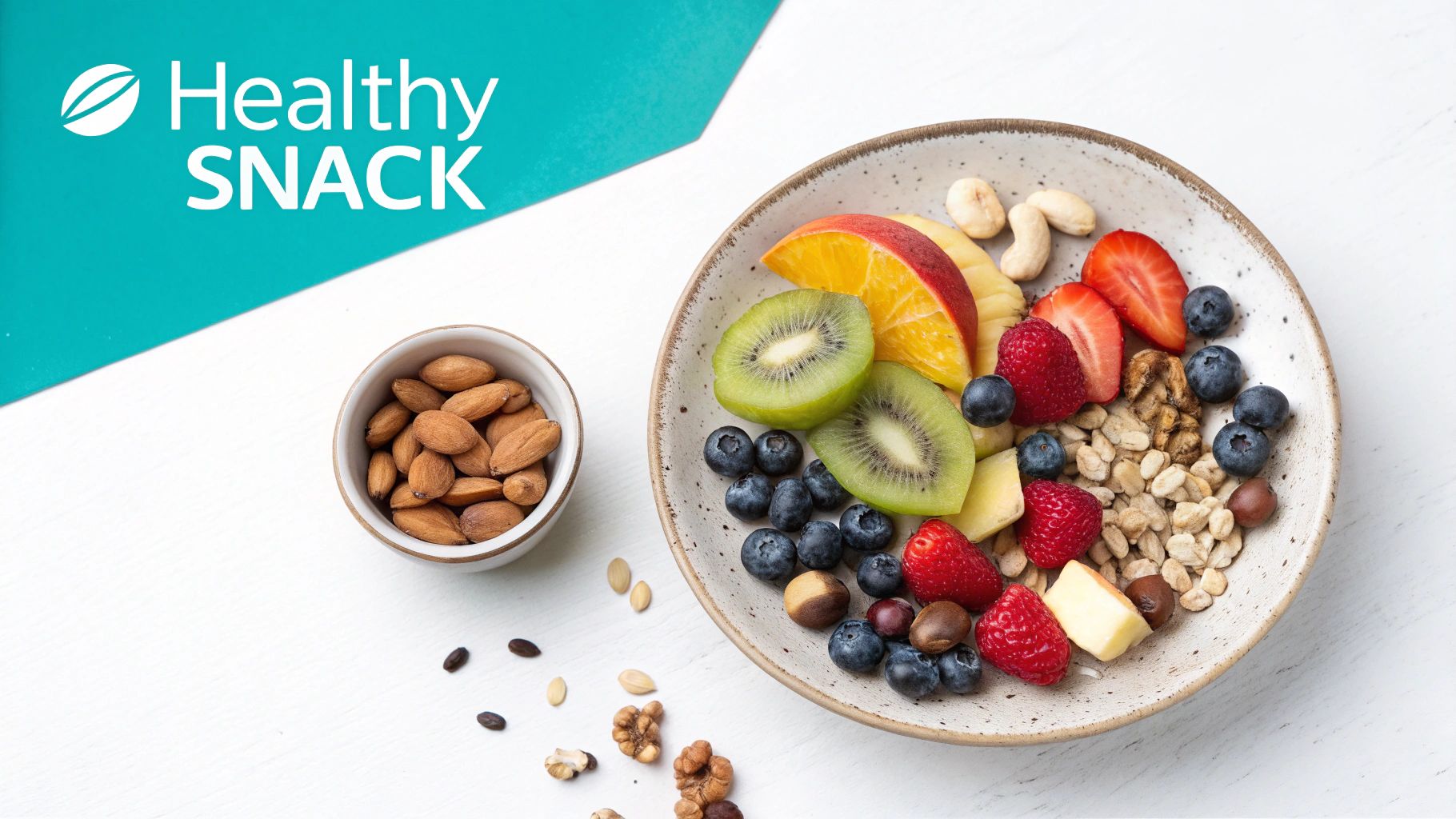
So, we know you can’t actually speed up your liver. The real game plan for how to feel better faster is all about managing the side effects and giving your body some much-needed support. While these moves won't magically lower your BAC, they can make a world of difference in how you feel while time does its thing.
The first thing you have to do—and this is non-negotiable—is to stop drinking alcohol immediately. It sounds obvious, I know, but every single extra drink just resets the clock and puts more strain on your system. Continuing to drink is only going to make things worse, pushing your BAC higher and dragging out the time it takes to feel human again.
Once you’ve put the drink down, your mission is simple: rehydrate. Alcohol is a diuretic, which is just a fancy way of saying it makes you pee a lot. That fluid loss is a major culprit behind the classic headache, dizziness, and fatigue you feel when you’re drunk and hungover.
Rehydrate and Replenish
Start sipping on some water. And I mean sip—don't chug it. Guzzling water when your stomach is already sensitive is a recipe for disaster. A pro move is to alternate sips of water with an electrolyte-packed drink like coconut water, a sports drink, or a rehydration solution.
Electrolytes are those essential minerals your body flushes out when you're dehydrated. Getting them back in your system helps everything run a little smoother and can seriously dial down some of the worst symptoms.
- Potassium: This is a big one for nerve and muscle function. A banana is your best friend here.
- Sodium: It's crucial for keeping your fluids balanced. A sports drink or even a few salty crackers can do the trick.
- Magnesium: Alcohol depletes this mineral, which is involved in hundreds of bodily functions.
Think of it like this: you're not trying to make your car's engine run faster, you're just giving it the fuel it needs to finish the trip without sputtering out.
Eat Something Smart
Food isn't going to absorb the alcohol that's already doing laps in your bloodstream, but it can help stabilize your blood sugar. Alcohol often causes blood sugar levels to dip, which is why you might feel weak, cranky, or tired.
The key is to aim for a light, balanced meal or snack. You want to get some nutrients in without making your stomach angry.
What to Eat (and What to Avoid) When You've Had a Few Too Many: Good Choices:
- A simple bowl of oatmeal or porridge
- Scrambled or boiled eggs (they're rich in L-cysteine, an amino acid that helps break down alcohol byproducts)
- A banana or some toast with avocado Foods to Skip:
- Greasy stuff like pizza or burgers can just irritate your stomach more
- Spicy foods might bring on heartburn or make you feel queasy
Eating something gentle gives your body the energy it needs to recover and can make a real difference with nausea and that unsteady feeling.
Find a Safe Place to Rest
Your body is working overtime, so one of the kindest things you can do for it is to just let it rest. Find a comfy, safe spot to sit down and chill out. If you're feeling dizzy, stepping outside for some fresh air can do wonders. Taking a few slow, deep breaths is also a great way to calm your nervous system and clear your head a bit.
A serious note: never try to "sleep it off" if you are dangerously intoxicated. If you're with someone who can't stop vomiting, is unresponsive, or has irregular breathing, you need to get medical help right away. But if you're just dealing with moderate intoxication, rest is your best bet.
For a little extra backup, you might consider something like Upside Hangover Sticks. They won't sober you up—nothing but time can do that—but they're loaded with the vitamins, minerals, and natural extracts that alcohol strips away. Taking one can help support your body's recovery, making you feel that much better while your liver gets the job done.
The Global Impact of High-Risk Drinking
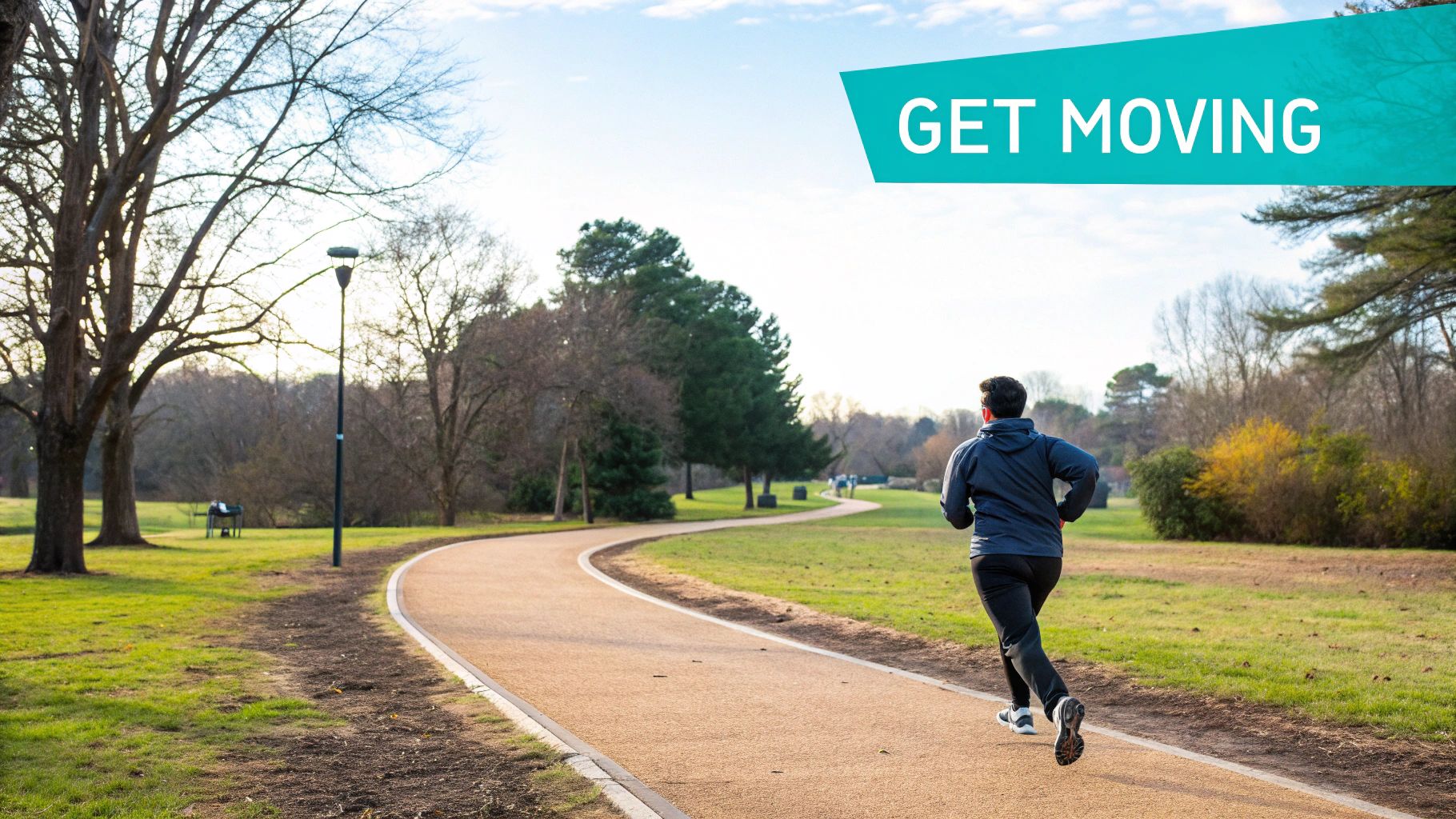
That desperate search for "how to sober up quickly" after a long night out? We’ve all been there. While your immediate goal is just to feel human again, it’s worth taking a step back. This moment is often a small part of a much bigger pattern of high-risk drinking, one with some pretty serious consequences on a global scale.
This isn’t about shaming anyone. It’s about connecting our personal experiences to a larger, crucial conversation about public health. Understanding this broader impact gives real weight to why drinking responsibly actually matters. High-risk drinking isn't just a "you" problem—it’s a massive health crisis affecting millions of people and their families every single year.
The numbers are genuinely sobering. Around the world, the harmful use of alcohol is a top risk factor for poor health. It’s tied to more than 200 different health conditions, from liver cirrhosis and various cancers to heart disease. The ripple effects tear through communities, overwhelming healthcare systems and causing huge economic losses.
A Disproportionate Toll on Young Adults
While alcohol’s effects are felt across every age group, they hit young adults especially hard. This is the demographic most likely to engage in binge drinking, a habit that puts an incredible strain on the body. It also dramatically increases the risk of accidents, injuries, and health problems down the road.
The statistics from the World Health Organization paint a pretty stark picture. In 2019 alone, alcohol use was responsible for an estimated 2.6 million deaths worldwide. An overwhelming 76.9% of these deaths were among men.
But here’s the most alarming part: young people aged 20–39 carry the heaviest burden, making up 13% of all deaths attributable to alcohol.
This isn't just data on a page. It represents a staggering loss of life during what should be the most vibrant and productive years for so many. It really hammers home why knowing your limits and making mindful choices is so critical for your long-term health.
When you connect the dots between one rough morning and these global trends, it can completely shift your perspective. The conversation changes from simply "how do I fix this hangover?" to "how can I adopt a more conscious approach to drinking?" This knowledge is powerful. It helps you protect not just your safety tonight, but your health for years to come.
Why Binge Drinking Complicates Sobering Up
That frantic feeling of needing to sober up right now usually hits after a night of going way too hard. But here’s the tough truth: that’s the exact situation that makes a quick recovery impossible.
Binge drinking isn't just about having a few too many. It's about completely flooding your system with more alcohol than it can handle, basically pushing your body into crisis mode and overwhelming your liver's ability to do its job.
So, what’s technically a binge? It’s a pattern of drinking that pushes your blood alcohol concentration (BAC) to 0.08 g/dL or higher. For most people, that means downing more than five drinks (for men) or four drinks (for women) in about two hours. When you drink that much, that fast, your BAC goes through the roof, and the timeline to get back to zero becomes dangerously long.
The Overwhelming Reality of a High BAC
Once your BAC gets that high, the math for sobering up is pretty grim. Your liver can only process alcohol at a steady, fixed rate—about one standard drink per hour. Binge drinking creates a huge traffic jam, leaving alcohol circulating in your bloodstream, affecting your brain and body for hours on end.
Think about it: a single heavy session can leave you legally intoxicated for way longer than you'd expect. If you slam six standard drinks in a couple of hours, it could easily take your body more than 10 hours to fully process all that alcohol. That means you could wake up the next morning and still be impaired enough to get a DUI.
The most critical takeaway is this: after a binge, your body isn't just processing alcohol. It's struggling to recover from a state of acute toxicity. This prolonged impairment dramatically increases your risk of accidents and poor decisions long after your last sip.
The Illusion of a Quick Fix
This is exactly why so-called "quick fixes" are a total myth. No amount of coffee, cold showers, or greasy food can speed up the massive job your liver is facing. Your body is stuck on a slow, non-negotiable timeline dictated by the sheer amount of alcohol it has to clear out.
Understanding this is so important for your safety. It shifts the focus from chasing an impossible quick fix to thinking about harm reduction. The smarter play is learning how to recognize the signs of a binge and planning for the aftermath, which really starts with knowing how to avoid a hangover in the first place.
A Few Common Questions About Sobering Up
Even with the best game plan, you might still have some lingering questions, especially when you're in the middle of it and just want to feel human again. Let's tackle some of the most common myths and concerns that come up when you're trying to sober up fast.
Can Throwing Up Help Me Sober Up Faster?
It’s a classic, desperate move. You feel awful, and you think getting the alcohol out of your stomach will fix everything. While it seems logical on the surface, it’s not the magic bullet you’re looking for.
Here’s the deal: inducing vomiting only gets rid of the alcohol that your body hasn't absorbed yet. If you’ve been drinking for a bit, a good chunk of that alcohol is already doing laps in your bloodstream. Making yourself sick won't do a thing about that.
More importantly, it usually backfires. Throwing up can dehydrate you severely, which is only going to make you feel a million times worse. Plus, it’s harsh on your esophagus and stomach lining, adding another layer of misery to an already bad situation.
Your best bet is to forget that idea and focus on gently rehydrating with water and getting some rest. It’s a much kinder way to help your body recover.
How Long Should I Wait To Drive After Drinking?
This is one of the most important questions, and the answer is refreshingly simple and totally non-negotiable: you should only drive when your Blood Alcohol Content (BAC) is zero. Period. There's no safe way to guess or estimate when you're okay to get behind the wheel.
Your body processes alcohol at a pretty steady rate—your BAC drops by about 0.015 per hour. A couple of drinks can easily put you over the legal limit for hours, even after a full night's sleep. Feeling "fine" is a terrible, unreliable gauge of your actual sobriety and reaction time.
- Don't trust your gut: Your judgment, coordination, and reaction time are all impaired long before you feel noticeably drunk.
- Always have a plan: The only smart move is to have a designated driver, call a rideshare, or just plan to stay put.
It's never, ever worth the risk. The only safe number is zero.
Do Recovery Products Actually Make You Sober?
This is a great question, especially with so many products out there promising to help after a night of drinking. It's really important to know what they can and can’t do.
Let's be clear: recovery aids like Upside Hangover Sticks are not designed to lower your BAC or sober you up. No product can magically speed up your liver. Instead, what they do is support your body's recovery process and help you feel better while your body naturally sobers up over time.
Think of them as your body's support crew. They work by:
- Restoring what you lost: Alcohol drains your body of key vitamins, minerals, and electrolytes. Good recovery supplements put them back.
- Fighting dehydration: Many contain ingredients that help your body rehydrate more effectively than just plain water.
- Supporting your liver: Some ingredients can help your liver deal with the byproducts of alcohol metabolism more efficiently.
They won't make the alcohol vanish, but they can make a huge difference in tackling those awful symptoms like headaches, brain fog, and nausea. It’s a much smarter (and safer) approach than chasing myths. If you want to get ahead of the game, our guide on how to prevent a hangover effectively has some great science-backed tips.
Ready to make your next morning a whole lot better? Give your body the support it needs with Upside Hangover Sticks. Our science-backed, easy-to-use jelly sticks are packed with natural ingredients to replenish what a night out depletes, helping you wake up feeling your best.
